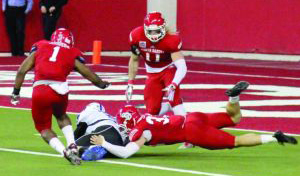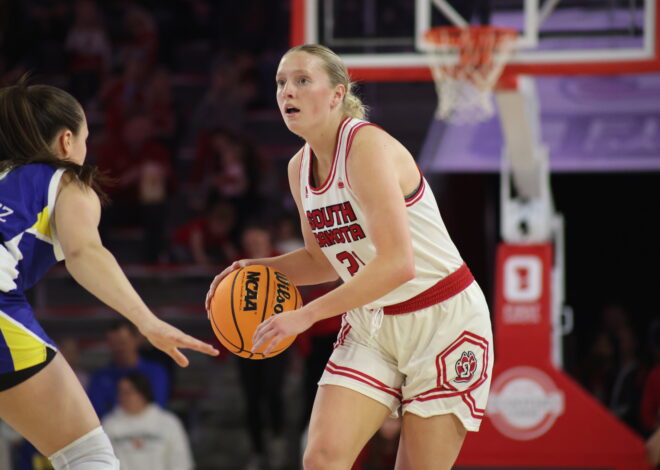
Right to unionize unlikely for USD athletes says Athletic Director Herbster
When the National Labor Relations Board granted Northwestern football players the right to unionize, questions for schools, players and fans came up across the nation.
University of South Dakota athletic director David Herbster said right now the decision only affects Northwestern, and he does not see it affecting USD athletics.
“It’s going to open up Pandora’s box in a way that no one really knows where this is going to go,” Herbster said. “A lot of (athletic directors) are taking this wait-and-see approach of what is the ruling, what is the appeals process going to look like and where is this going to end up.”
Led by College Athletes Players Association and Northwestern quarterback Kain Colter, the labor union discussion currently has a fixed agenda.
Being able to come together as a union, players will be able to fight Northwestern over medical benefits as well as other benefits.
Head football coach Joe Glenn said the potential for players to unionize does not impact Coyote athletics at the time.
“It will have an impact in time with Division 1 FCS schools, and I think we’re talking about the power five conferences,” he said.
With USD breaking even in athletics the last fiscal year, athletes probably won’t expect payment soon. Herbster said that discussion is more for schools with profits in the millions – Florida, Michigan, Texas.
If valued as employees, USD in-state student-athletes currently are valued at over $15,000 each academic year and out-of-state is only a few thousand more.
Another added discussion to labor talks is inclusion of other scholarship student-athletes under an athletic department. According to national reports and legal discussions, talks would also jump to the effect on other sports, men and women, profitable or not profitable.
Megan Hilson, a senior distance runner for USD track and field, said there is an obvious difference in exposure between football and smaller sports like track, but she said that shouldn’t make it OK to provide more benefits to those athletes.
“We’re all here working hard. We’re all here representing the same school,” Hilson said. “We’re all equal.”
Hilson said the biggest benefit provided to student-athletes is the opportunity to get an education. To her, making life-long friends and competing are enough.
Herbster said these student-athletes should not ask for many more benefits since they are “under contract.”
It’s not so much different from an academic scholarship, he said.
“Are they under contract? Well, in a way, they are, as they sign a scholarship contract that says they are,” Herbster said. “But if you get a Mickelson Scholarship or Presidential Scholarship from USD, you are put under a contract there because you’ve taken that money, and for taking that money there’s things you have to do.”
Athletic scholarships and academic scholarships each have standards to uphold — grade point average, classes, programs or practice times.
At USD, the money just isn’t there to have student athletes under a labor union, Herbster and Glenn said.
Pay-for-play salaries – one of the longest-standing controversies in an era where television contracts and merchandise sales have colleges and the NCAA cashing in on college athletes’ performances — is not on the agenda for CAPA.
Economists and sports writers said labor unions will lead to added pressure for pay-for-play salaries across the nation.
Herbster sees added salaries as a problem, one that would create a professional versus amateur controversy.
“Somebody asked me this awhile ago: Are they employees? No. They’re students, and as soon as we start looking at them as employees, not students, college athletics change to professional sports,” he said. “Right now, it’s not professional sports.”
Glenn said days of change are coming fast.
“We’re getting to the day where you’re going to see athletes getting paid,” he said. “And if you’re going to be paying football, you’re going to have to pay all the athletes at that university and you’re going to have to pay the women.”
Glenn said scholarship athletes shouldn’t need any more benefits, considering they are already provided their scholarships and benefits such as preferred housing.
Senior football player Steve Tellefsen said the benefits of a full athletic scholarship and playing the game he loves is what matters, even if he isn’t receiving full medical help later in life or an added salary.
“The full scholarship means everything,” he said. “Even if we don’t get fully paid, it’s a blessing to have a scholarship. College costs a lot, so being able to have a free education is a blessing.”
At Northwestern, a full athletic scholarship is valued at more than $200,000 over four years.
On top of just salaries, Glenn said conversations are even flowing around the NCAA about giving bigger schools more control over rules and regulations they abide under.
“Over the years, I’ve always said that when they get to this, who’s going to enforce the rules?” he said. “Who knows if someday they’ll be a part of the NCAA? Then they’ll have to start a whole new NCAA-type enforcement.”
Herbster said these talks and changes could be ruining the integrity of college athletics, which rely on the volunteer commitment student-athletes show.
“College athletics is supposed to be an amateur, volunteer athletics participation activity,” he said. “That’s a subtle way of putting it. To me, they are not employees.”


